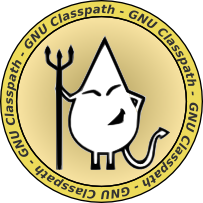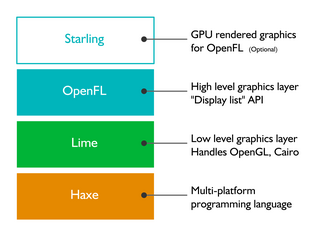Berkeley DB (BDB) is a software library intended to provide a high-performance embedded database for key/value data. Berkeley DB is written in C with API bindings for C++, C#, Java, Perl, PHP, Python, Ruby, Smalltalk, Tcl, and many other programming languages. BDB stores arbitrary key/data pairs as byte arrays, and supports multiple data items for a single key. Berkeley DB is not a relational database.
A GPL linking exception modifies the GNU General Public License (GPL) in a way that enables software projects which provide library code to be "linked to" the programs that use them, without applying the full terms of the GPL to the using program. Linking is the technical process of connecting code in a library to the using code, to produce a single executable file. It is performed either at compile time or run-time in order to produce functional machine-readable code. There is a public perception, so far unsupported by any legal precedent or citation, that without applying the linking exception, a program linked to GPL library code may only be distributed under a GPL-compatible license. The license of the GNU Classpath project explicitly includes a statement to that effect.

GNU Classpath is a free software implementation of the standard class library for the Java programming language. Most classes from J2SE 1.4 and 5.0 are implemented. Classpath can thus be used to run Java-based applications. GNU Classpath is a part of the GNU Project. It was originally developed in parallel with libgcj due to license incompatibilities, but later the two projects merged.
Filesystem in Userspace (FUSE) is a software interface for Unix-like computer operating systems that lets non-privileged users create their own file systems without editing kernel code. This is achieved by running file system code in user space while the FUSE module provides only a "bridge" to the actual kernel interfaces.
iText is a library for creating and manipulating PDF files in Java and .NET.
A source-code repository is a file archive and web hosting facility where a large amount of source code, for software or for web pages, is kept, either publicly or privately. They are often used by open-source software projects and other multi-developer projects to handle various versions. They help developers submit patches of code in an organized fashion. Often these web sites support version control, bug tracking, release management, mailing lists, and wiki-based documentation...

Zooko's triangle is a trilemma of three properties that are generally considered desirable for names of participants in a network protocol:
The Ruby License is a Free and Open Source license applied to the Ruby programming language and also available to be used in other projects. It is approved by the Free Software Foundation although it has not been approved Open Source by the Open Source Initiative.
Moose File System (MooseFS) is an Open-source, POSIX-compliant distributed file system developed by Core Technology. MooseFS aims to be fault-tolerant, highly available, highly performing, scalable general-purpose network distributed file system for data centers. Initially proprietary software, it was released to the public as open source on May 5, 2008.

Akka is a free and open-source toolkit and runtime simplifying the construction of concurrent and distributed applications on the JVM. Akka supports multiple programming models for concurrency, but it emphasizes actor-based concurrency, with inspiration drawn from Erlang.
GaiaEHR is a Medical practice management software which also supports Electronic Medical Records. GaiaEHR is one of the various open source technologies.

Webix is a JavaScript and HTML5 framework for developing cross-platform HTML5 and CSS3 compatible applications. The framework is developed by IT outsourcing company XB Software, headquartered in Minsk, Belarus.

OpenFL is a free and open-source software framework and platform for the creation of multi-platform applications and video games. OpenFL applications can be written in Haxe, JavaScript, or TypeScript., and may be published as standalone applications for several targets including iOS, Android, HTML5(choice of Canvas, WebGL, SVG or DOM), Windows, macOS, Linux, WebAssembly, Flash, AIR, PlayStation 4, PlayStation 3, PlayStation Vita, Xbox One, Wii U, Tivo, Raspberry Pi, and Node.js.
ND4J is a scientific computing and linear algebra library, written in the programming language Java, operating on the Java virtual machine (JVM), and compatible with other languages such as Scala, and Clojure. ND4J was contributed to the Eclipse Foundation in October 2017.
Software relicensing is applied in open-source software development when software licenses of software modules are incompatible and are required to be compatible for a greater combined work. Licenses applied to software as copyrightable works, in source code as binary form, can contain contradictory clauses. This requirements can make it impossible to combine source code or content of several software works to create a new combined one.







